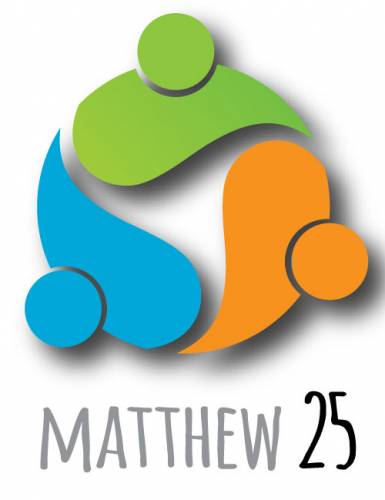The Presbyterian Church encourages its congregations to identify themselves as Matthew 25 churches. That means they willingly embrace one or more of these three focuses: building congregational vitality, dismantling structural racism, and eradicating systemic poverty.
I’ve been hearing more and more about the Matthew 25 initiative. We already have one of our congregations accept this challenge: First Presbyterian Church, Dunbar. At its most recent meeting, the Synod of the Trinity declared itself to be a Matthew 25 synod.
At the Mid-Council Leaders Gathering in Baltimore, we got to see some of the material that’s been developed. There’s a Worship Guide, as well as material that supports the lectionary passages from the Gospel of Matthew from Advent through Pentecost. There are plans for a second booklet that will cover the rest of the church year. Most of this material is already available on the PC (USA) website or will be posted online as soon as it’s ready. I encourage you to take a look. I also understand that most of this material will be mailed to congregations sometime soon.
I admit I was initially somewhat skeptical. Well, skeptical may not be the right word. It seems that this initiative was introduced at the last two General Assembly meetings. If it was there, I didn’t notice it. That may be because the Presbyterian Church is doing so many good things that’s it’s hard to keep up with all of them. The more I look at this material, though, the more helpful I think it can be. I absolutely resonate with the idea that “Matthew 25:31-46 calls all of us to actively engage in the world around us, so our faith comes alive and we wake up to new possibilities.” Matthew 28:16-20, the Great Commission, points us in the same direction. It can become easy for our focus to shift inward if we’re losing members and struggling to meet our budget. Maybe it’s also easy for our focus to shift inward if we’re gaining members and trying to meet the additional needs of those newcomers.
We all need to work on building congregational vitality. Any ideas that help us to do that are a good thing. We might like to think racism is dead, a thing of the past, but if we think that, we’re not paying attention, or we have white skin. Dealing with racism may make us uncomfortable. It needs to make us uncomfortable. Maybe this material can help us begin to at least think about and hopefully begin to address this issue.
I’m not sure whether structural racism or systemic poverty is the biggest challenge facing our nation and the issue that’s most ignored by the church. I’m sure you could make strong arguments for either one. The reality is that we don’t do a good job dealing with either of them. Any suggestions that can help us face these challenges will be a blessing.
It might be tempting to ignore all of this. It’s hard enough to keep doing all that we’re already doing. I’m not sure that we necessarily need to do all that more. However, if we can find a different way to look at the world around us, if we can find a different way to listen to scripture, if we can find a different way shape our worship, we will be more faithful.
To me, that’s the goal of the Matthew 25 initiative – to help us be more faithful. You don’t have to adopt everything that’s put out there. You don’t even have to sign up to be a Matthew 25 church, although you may want to consider doing that. I’d encourage you, though, to take a look at this material. Talk about what you might do. Try some of the worship material. Pray about what it would mean for your church to be more faithful. To me, that would be a good goal or a good New Year’s resolution for each of our churches: to be more faithful in 2020. Maybe Matthew 25 can help you do that.

